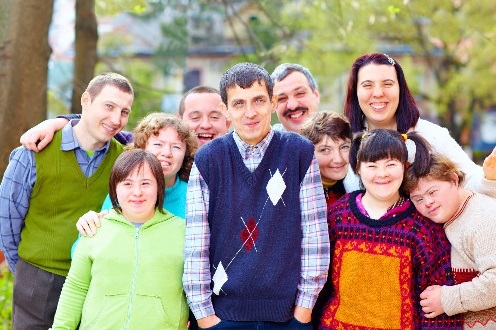
The STEPS program helps people with intellectual disabilities to develop social problem skills for dealing with their problems in order to reduce behaviors that are disruptive or harmful. This program provides important day-to-day guidance and support that encourages attitudes and behaviors that foster community participation at home and at work. The program can help people with intellectual disability to develop skills to communicate their needs, express themselves, fulfill their goals and dreams, and lead healthy and full lives.
PURPOSE OF THE STEPS PROGRAM
Our goal is to improve social problem solving skills for adults with intellectual disability and to decrease aggressive and challenging behaviors. The STEPS program teaches adults with intellectual disability and the residential staff who work with them techniques for managing behaviors when problems arise. Participants are given support and guidance in identifying and associating or linking problems, reactions, consequences, and problem solutions. Participants also learn skills for recognizing and identifying problems and managing their own reactions while working through this program in a calm environment.
This research project is a clinical trial and the study consists of an experimental group which is the STEPS behavioral management intervention and a control group which is the Food for Life nutrition training intervention. Participants will be assigned randomly to one or the other group, but no one will participate in both groups. Ultimately, our hope is that agencies will be able to implement these programs themselves. The group facilitators are QIDPs, or similar professionals who have experience working with adults with ID.

BACKGROUND OF THE STEPS PROGRAM
This study was designed to incorporate strengths found in previous research while addressing the gaps in the literature. Specifically, this intervention is one of the first to conduct a social problem-solving intervention with people with intellectual disability in their home environment. In addition, this is one of the few social problem-solving interventions that systematically involve support staff and the group environment on order to enhance the intervention. This is particularly critical because these homes operate like a family and often problems impact several people in the home.
FOUNDATION OF THE STEPS PROGRAM
STEPS is a social problem-solving training program that is based on the ADAPT method (Nezu, Nezu & D’Zurilla, 2006). This training program was developed with input from people with intellectual disabilities and from direct support persons at community agencies and can be used to help people deal with both big and small problems. Each letter in ADAPT stands for a different step in the problem-solving process: Attitude, Define, Alternatives, Predict and Try Out. This program consists of six sessions each of which focus on a different aspect of ADAPT and then one review session and one booster session.

Step 1: Attitude
Having a positive attitude towards problem solving refers to both the ways in which a person views a problem and their confidence in their own ability to solve it. This does not mean that people need to remain positive when they are angry, upset, or sad. A positive attitude about one’s ability to solve problems in turn positively impacts their success in dealing with and solving problems, even ones that they perceive as uncomfortable or intolerable. This step involves having participants learn the difference between positive and negative perceptions of problems and their ability to solve them.
Step 2: Define
Defining problems refers to learning to break down a problem into manageable pieces and to put a problem into context. This step involves helping participants to recognize their bodily reactions to problems, as well as techniques for stopping and slowing down.
Step 3: Alternatives
Alternatives refers to coming up with different ways to solve and deal with problems. This step involves helping participants to think through different ways to address their problems.
Step 4: Predict
Predict refers to thinking through and predicting what might happen given the alternative ways to solve problems. This step involves helping participants think through what might happen depending on their reactions to their problems.
Step 5: Try Out
Trying out refers to thinking through and actually trying out different ways to solve their problems in order to pick the solution that works best for them.
FUNDING
This project is funded by the Eunice Kennedy Shriver National Institute of Child Health and Development (R01 HD086211-01A1)
OUR RESEARCH TEAM
Study Principal Investigator
Sarah H. Ailey, PhD RN CDDN APHN-BC
Professor
Department of Community, Systems and Mental Health Nursing
Project Coordinator
Teresa T. Moro, PhD, AM, LSW
Study Co-Investigators at RUSH
Dr. Arlene Miller
Dr. Olimpia Paun
Dr. Michael Schoeney
Dr. Tricia Johnson
Other Co-Investigators and Consultants
Dr. Tamar Heller, Co-Investigator, University of Illinois
Dr. Janet Melby, Co-Investigator, Iowa State University
Dr. Arthur Nezu, Consultant, Drexel University
CONTACT US
We have worked with several local agencies serving adults with intellectual disability who live in a small group home. We are still actively recruiting for the study. If you think the STEPS project is a good fit for your agency, please send us an email or give is a call.
Teresa Moro, PhD, MSW, LSW
Project Coordinator
RUSH Medical Center
teresa_moro@rush.edu
Phone: (312) 563-6001
Sarah H. Ailey PhD, RN, CDDN, APHN-B
Department of Community, Systems and Mental Health Nursing
sarah_h_ailey@rush.edu
Phone: (312) 942-3383
Fax: (312) 942-6226
